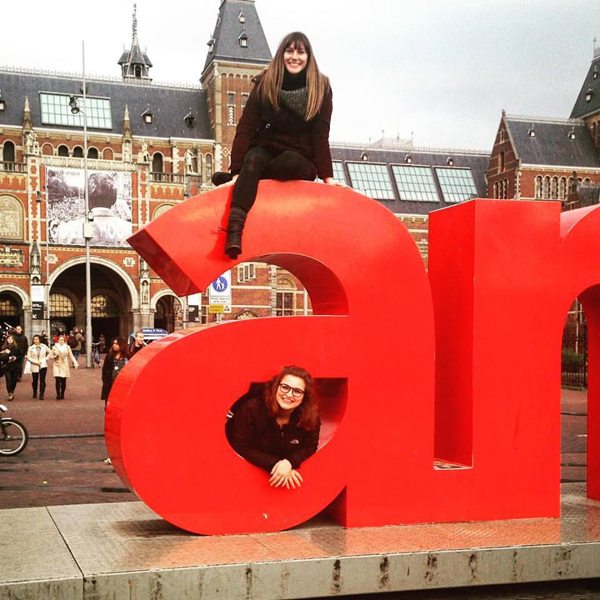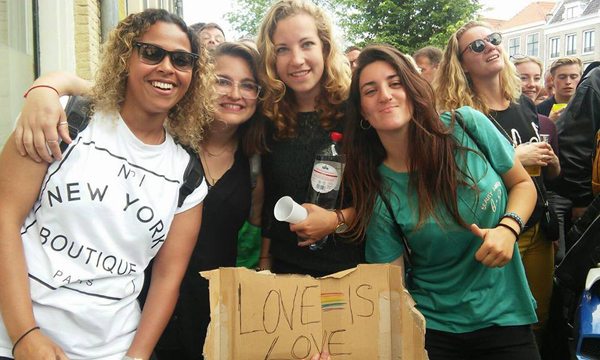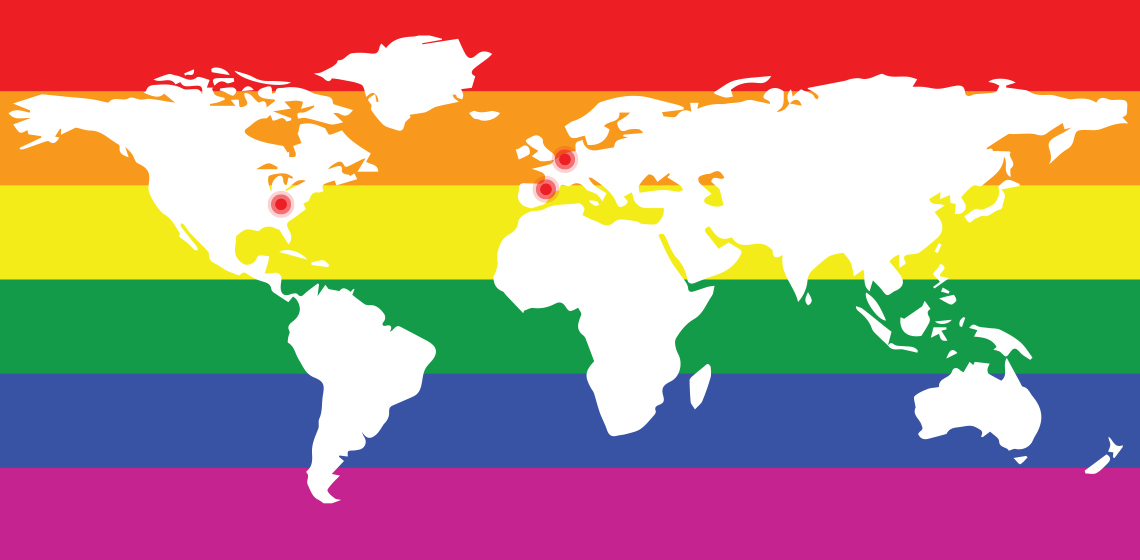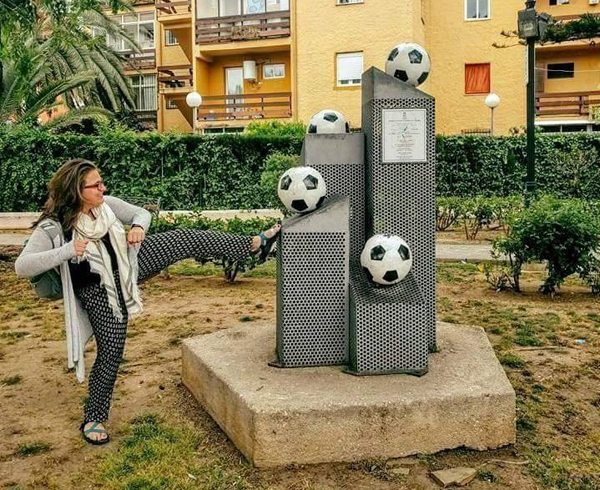Last month we talked with Aryadne and Mari about how it feels to live in Curitiba, Brazil as lesbians*. They told us, for example, that in their state same-sex marriage is legal, along with adoption, something we Hungarians are still very far from. Nevertheless, later they revealed that Brazil generally, and Curitiba specifically, is very violent towards minorities. In fact, it is not uncommon to get killed simply for being gay - which fortunately is not at all the case in Central Europe. Thanks to their insight, we had to realize that political rights do not necessarily go hand in hand with acceptance and safety.
For our second interview, we invited Angela, an American who spent some time in Mallorca and now lives in Amsterdam. Legally speaking, each of the three countries she has been affiliated with, are among the most progressive ones: same-sex marriage, as a point of reference, is legal in all three.
But is it all the same to live in the US, in Spain, or in the Netherlands? How much does it matter which specific city you reside in? We have asked Angela to give us the insider’s view about the peculiarities of living as a lesbian* in various gay-friendly cities in Europe and America.
Thanks for being with us today. Can you introduce yourself briefly?
My name is Angela, I’m 28. Originally I am from Raleigh, North Carolina, but I moved to Europe. I studied Linguistics in university because I love to travel and wanted to be able to talk to people all over the world. So far I've lived in Italy, Spain, and the Netherlands working as an English teacher, data analyst, and writer.

Impressive. You’ll have a lot to tell us. Let’s look at your home country first. How is it to live in the US as an LGBTQ+ person in general?
It really depends on the city and state. If you're from an extra conservative state, like Texas for example, it's more likely that you've grown up with family who have very negative attitudes to homosexuality, plus some of the more liberal states, like California, had legalized same sex marriage years before the ruling that made it legal for the whole country.
So I think that makes a big difference when you know that attitudes and the environment in your state are largely accepting. There's maybe less pressure. Plus, more conservative states tend to also be very rural (think about Arizona, the Grand Canyon state, in the middle of desert), so you would have a much harder time finding any sort of LGBT community or support, or things like gay bars.
I think in this way, Raleigh is rare because it is such a progressive bubble in an otherwise 'red state' (which is how we call Republican, that is, conservative states).
So, once again, same-sex marriage is legal in the United States, right? What about adoption?
Yes, same-sex marriage was legalized for the whole country 2 years ago. As for adoption, I think that depends on the laws in whichever state you live in, but I'm not sure. (Thanks to a pretty recent Supreme Court decision, all states in the US are required to treat same-sex couples equally even in terms of adoption. - Editors.)
Let’s get a bit more local then. Now tell us a bit about the cities where you lived. For example, how often can you see same-sex couples holding hands or showing any other sign of affection publicly?
In Raleigh, it's quite rare, but maybe that is more of an American thing in general. It is so even if you go to a gay party. I feel like I've seen same-sex couples being affectionate in public much more in Mallorca and Amsterdam, and to tell you the truth, there are also many more queer spaces and events.

Then let’s talk about lesbian* social life. Tell us a little bit about Raleigh, Mallorca, and Amsterdam from this aspect.
Amsterdam is by far the best city for lesbian social life that I've ever lived in. There are a couple of specifically lesbian cafes and bars, and a couple times a month there will be lesbian parties at different clubs. People use Tinder and Her to meet online a lot, and since it's a big city, you always have tons of matches. There's also a really active lesbian social MeetUp group that organizes tons of events like nights out, squash or other sports, cinema, etc.
This is probably the opposite of Raleigh!!! There is an LGBT community center with a really nice group of ladies and they host nice events occasionally, but the group is tiny. There are no queer spaces except for one gay club with drag shows, but there are almost always just men there. You pretty much have to meet people online using Tinder, or OkCupid is really popular for more serious dating. But you run out of matches/new people really, really quickly. It's frustrating and even though I love the city and the people, is a big factor in why I would be hesitant to move back there if I were single.
In Mallorca and Amsterdam, I joined soccer teams to meet other lesbians*. I've never played soccer before in my life. But it was definitely a super effective way to meet awesome lesbian friends. I seem to have charmed my way in, despite being a terrible athlete.
Haha, good job, you are very resourceful! Soccer teams are gold mines in Hungary too.
I can imagine, hahaha.
Now what about Pride?
In Mallorca and Raleigh, Pride is quite small, but of course always fun. People don't make as big of a deal of it though as in Amsterdam, where we've been making plans for Pride week/weekend for MONTHS! And it’s a lot of fun! Even this year it was awesome! There were huge parties in the street all day, after the canal parade, and the whole city was completely packed. Some of my Dutch friends said that it's unique because here, Pride is more for everyone to celebrate, and not just something for gay people. The whole week, everything in the city was decorated with rainbows, even the trams were rainbow colored.

That does sound like fun. Definitely worth being part of. But tell me, altogether, which city would you recommend our community to visit or live in?
I would definitely recommend Mallorca or Amsterdam to visit or live. Raleigh has a really nice quality of life as well, but it can be really hard to meet people there, so I would not recommend moving there alone and single.
Amsterdam is obviously an LGBTQ+ hotspot in many ways, but Mallorca too has the ELLA International Lesbian Festival every summer, and also many parties and events throughout the year for locals. Also it's a gorgeous island with a beautiful and amazing culture, so a great blend of parties and nightlife but also relaxing on the beach, swimming, hiking in the mountains, etc., and in general it’s very gay friendly.
Thanks a lot, Angela. Undoubtedly, see you next August in Amsterdam!
The United States, Spain, and the Netherlands are way ahead of us in terms of LGBTQ+ rights; this definitely doesn’t come as a surprise to any of us. Nevertheless, how life really feels on a daily basis depends much more on the specific city we live in.
If you take the United States, as Angela hinted, there are huge differences between living, say, in San Francisco, perhaps the best-known gay-haven in the world, and, for example, in Orlando, where last year 50 people were killed simply for being in a gay bar.
In connection with Europe, Angela revealed it still matters where you live even within the typically gay-friendly countries. Each city has its peculiar culture and opportunities: in Mallorca, for example, she had to join the soccer team to meet lesbians*. Contrary to this, Amsterdam offers so many gay-friendly, or specifically lesbian*, events that it is simply impossible to attend each.
In short, the conclusion is again that we need to look deeper to get a realistic - not just a general - picture about how green the grass it out there.
Next month we will talk with Yosi from Tijuana, Mexico, who will unveil the ugly truth that what we think we know about Mexico, the world’s 10th most populous country, is shamefully little (and most often wrong).


